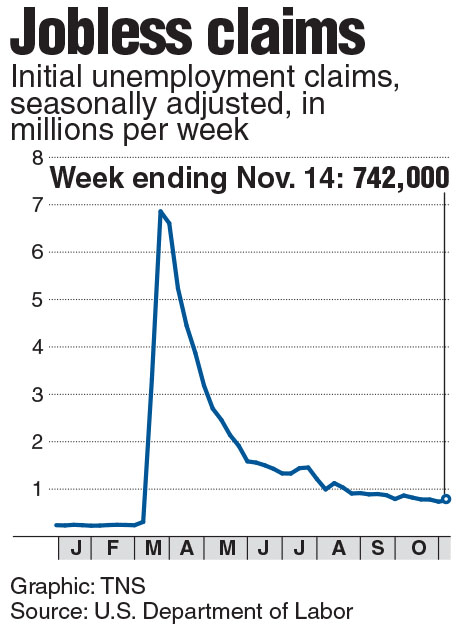Could a jobs guarantee be a key for this economic crisis?
Weekly unemployment insurance claims. Tribune News Service 2020
December 3, 2020
Anyone who is able to work, and can not find luck in the private sector(any job where the government is not the employer), would have the public option to work in a job provided by the government. These jobs would be in repairing the nations infrastructure, such as roads/parks/schools and infrastructure such as rebuilding the nations health/economic systems. In many proposals of the JG benefits such as health care/vacation days are offered.
Have we seen a Jobs Guarantee in any other parts of the world?
MGNREGA
In India, there is the Mahatma Grandi National Rural Employment Guarantee Act(MGNREGA). However, it has had a variety of impacts depending on the state enacted. The primary issue for skeptics of the job guarantee was that there were lower turnouts for this program where there were higher poverty levels. However, for $8.9 billions it has provided jobs to 50 million rural households.
Plan Jefes
Currently, the US spends about 1% of GDP on anti-poverty measures. For about the same in Argentina, they initiated Plan Jefes to combat the economic crisis from 2001-2002. However, it had many restrictions on who exactly could sign up for the program. These included rules such as limit one per household, signing up before a deadline, having either children under 18 or a pregnant or disabled persons. On top of this all other safety net and social spending programs were eliminated.
United States
In an effort to combat the Great Depression, Roosevelt enacted many things such as the WPA(works progress association) and the CCC(Civilian Conservation Corps). These programs were effective crisis mitigation methods but they were not built to be long term programs. These methods serve to show how a JG has worked in the US, but only as a crisis mitigation method.
What are proponents are saying?
Proponents of JG propose that these programs would serve as an automatic crisis mitigation method, solve for unemployment, and may even serve as a pathway to combatting climate change.
1. A JG is meant to serve as an automatic stabilizer during economic down times. When people would loose their jobs, they would be employed in a job guaranteed by the government. This would serve as an automatic stimulus, that would grow when needed and shrink when not. Instead of the congress sitting through long meeting to decide if they would be providing stimulus and the precise logistics of the stimulus, the JG would be there to serve pandemic needs.
The question arises… where would these jobs come from?
In crisis jobs usually arise. For example, with this pandemic, the holes in infrastructure of contact tracing were exposed. A JG could have potentially reduced unemployment during this economic crisis and bettered the mitigation of said crisis.
When not in crisis, jobs would focus on bettering the default outdated infrastructure of the US’ health/aid departments.
2. The first step in bettering Climate Crisis Combatant is gathering labor. A JG provide the skills and transition to a clean energy society. Kaitlin Robinson, an editor at Bloomberg Green, explains it like this, “some moving from jobs lost to the Covid-19 depression and its rearrangements, others to technological improvements, others still to climate pressures—all together adding up to a huge jobs shakeup and reorganization…there is always more work to be done than people to do it. And because there is, in this possible future, also a federally mandated job guarantee, you and millions of others are finding your way to the new jobs popping up everywhere. The coordination and sometimes the pay are provided by government, while the specific job requests come from any local projects that need labor.”If there is a time to reorganize the labor market, proponents say it’s now. The ‘shakeup’ has led for the opportunity to better infrastructure of unemployment and even re-directing towards the climate crisis.
What are skeptics saying?
The main concerns from skeptics are mainly the cost/feasibility and private sector crowd out.
1) The private sector included big conglomerates such as Walmart and Amazon, but also included millions of family owned businesses. The concern is that if a JG were to be enacted, these businesses would not be able to keep up with these demands. These demands may include the inclusion of healthcare, better working environments, and a more secure job.
“Some might consider leaving their jobs to pursuance guaranteed roles if they perceive better working conditions or an easier work life….the net consequence is highly likely to be weaker private sector job creation in poor regions, which has been the experience of countries such as Britain,” The Chair for the Public Understanding of Economics, Ryan Bourne theorizes.
Many also argue that because of the JG, the government will have to create “make work” jobs. These jobs will not have true meaning and thus the people working them would have no purpose. So what ends up happening is that millions of people are employed in meaningless, but secure job options. This ends up leading to private sector businesses either closing down or turning to more dangerous means of reducing cost, automation. And most of these family owned businesses will not be able to keep up.
2) Two popular plans such as the Tcherneva Plan and the Paul et al Plan cause $702 billion and $840 billion for only about 15 million people respectively. These programs do not address cost largely but the Paul plan proposes to raise taxes and the Tcherneva plan claims that the program will eventually pay for itself.
Another concern that branches off this is trade offs. To pay for the government program the government may have to take away Or trade off spending from other programs such as government provided health care. This impacts marginalized groups that can’t work due to disabilities or cant work due to other obligations such as taking care of children or family members. The spending that could go toward bettering these infrastructures will instead go to a JG that would not benefit the people in dire need to work.
Bhandari, an economic policy advisor at Third-way closes, ‘What we’re left with is a new program taking up funding that could instead be used instead for things like increased childcare, training support, expanded health care coverage and more.”
Conclusion
As for my opinion on this, I believe there is a dire need for efficient stimulus programs during times of economic crisis. There are many benefits toward a jobs guarantee, but they would need to be executed in an extremely specific manner. I do not think that a JG should be enacted for any use besides crisis mitigation. Whilst a JG could provide economic stability and better societal infrastructure, the issues of private sector crowd out as well as feasibility need to be addressed. Do you think it is time to enact a Jobs Guarantee?








